- Home
- Karen Traviss
Matriarch Page 20
Matriarch Read online
Page 20
Those having choices must make them.
Targassat taught that, too. She was a most inconsistent isan. What might she and this Darwin have discussed if they could have met?
Esganikan had made her choices as every Eqbas had for millennia. She wasn’t ashamed of them.
Bezer’ej
Every time Lindsay woke now, she wanted to scream.
It took a few seconds for her to remember that she wasn’t drowning but surviving. That bothered her: humans had a swimming reflex and all the signs that they remembered their primeval aquatic origins. Her brain should have dealt with the new reality.
How long have we been here?
It wasn’t months, she was sure of that now, or even weeks. They’d settled near enough to the surface with their bezeri captors to see the daily cycle of light and dark. And the lamp was still working. She examined it and wondered about its power source. With its hemispherical case and its flat lens, it reminded her of the headlamp of an ancient car.
But she hadn’t had many conversations with Saib and the remnant of his people. They’d gathered in the deserted ruins, a ragtag community of the elderly and a single family, fifty or so individuals in all including a few very young infants.
They couldn’t rebuild their species from this; it might have been kinder if they’d all died. Now they would watch their civilization—their entire race—disappear in the slow fullness of time.
She couldn’t let that happen.
“I’m going to get some more maps,” she said.
Saib shimmered. You should clear the repository today. We believe we have found more records south of here. But we must examine and put in order what we have retrieved so far.
She glanced at Rayat and laid the lamp down. “He’ll help you sort them.”
The bezeri appeared to trust her to go off on her own now. It wasn’t as if she had anywhere to run. She’d expected abuse and torment, but the bezeri were far more concerned with gathering their history around them than exacting revenge on her. Perhaps they thought they had their vengeance. Every time she ate weed or reminded herself that she was stuck here for the rest of her infinite life with a man she loathed, she knew they had.
In the repository, she examined the faced stone and the intricate detail of the carved images. Animals she didn’t recognize and plants that she did chased up the walls to the vaulted ceiling. Bezeri had the same ability as human artists to reproduce exact images, and everything she saw reminded her that she had helped destroy the remnant of an ancient and fragile civilization.
She gathered the last of the maps and took off her shirt to make a temporary bag, knotting the sleeves and fastening the front. The weight slowed her down. She resorted to walking along the seabed in a bouncing motion.
I can handle this. I can survive and I can do something for these people.
Gathering their maps wasn’t much in the scheme of things. Maybe she could locate other bezeri communities so that they could breed. Most bezeri had gathered in the ancient spawning grounds around Ouzhari. But this small group hadn’t gone; she found it hard to believe there weren’t others like them.
Eqbas based here had found Saib and his group. Maybe they could find more in time.
Bezeri were vulnerable to land-living species: they had no technology that could stand up to the hard metal and ordnance of a spacefaring, terrestrial civilization.
So that’s my job. That’s my mission. Save them—somehow. Whatever it takes.
Lindsay needed a focus, and now she had it. When she got back to the settlement, Rayat was squatting over a pile of shell maps in one of the cone-shaped houses and examining them with Pili.
Then she realized his attention wasn’t fixed on the maps but on his own hands. She’d rarely seen him look shaken; but he did now.
He was examining his hands with rapid, frantic movements, flipping them over palm to back to palm again, and his gill slits were opening as if he was panting.
Oh shit. Gills. I’ve got gills too.
She looked at her own hands: nothing, and no lights. She settled beside Rayat and grabbed his fingers.
“Oh my God, you’re turning transparent.” She could see the purple and red snaking branches of blood vessels near the surface of his skin, and the hint of pale bone. “Like them.”
Rayat’s eyes were wide and horrified. But he pressed his lips together in a thin hard line and his gills flared. “Very scientific analysis, Commander. I can always rely on you for a rational view.”
Lindsay knew she would now be checking herself every few minutes for signs of translucency. Why is that so much worse than gills or echolocation or whatever other weird adaptations c’naatat’s giving you right now? It was worse, because she could see it. Without a mirror, her other changes were visible only in the expression on Rayat’s face.
Shan never changed, of course. Shan just became more of Shan than she’d been before. Suddenly Lindsay both envied and hated her with renewed venom for her absolute iron certainty in herself and the way the world should have been.
Lindsay had to find that certainty, too.
Saib drifted towards them and hung there with his lights on what Lindsay now thought of as tick-over—a steady speckling of green. She waited for the lamp to translate but there was nothing. Then he drifted away again, mantle pumping slowly like bellows.
“I’m going to look for food,” said Rayat.
Lindsay grabbed the lamp and followed him outside. She sat in the filtered light and picked fronds off a rock to chew them. Rayat tried them too. Pili swam towards them and appeared to watch.
They will poison you, she said, shimmering a rainbow of urgent colors.
“We can’t die,” said Lindsay. “Haven’t you noticed?”
It was the first time she’d realized that bezeri had individual levels of intelligence, exactly like humans. Wess’har seemed uniformly intelligent and…superior. Pili hadn’t quite worked out what was happening; but then she’d never seen humans before, and a human confronted with a bezeri would have no idea what degree of adaptation was normal for them, either.
Lindsay felt an odd kinship, and wondered if it was the bezeri tissue worked into her open wound, or a genuine moment of epiphany.
Or maybe it’s because I know how it feels to lose a child.
She chewed on the fronds, concentrating on the satisfying texture, and found she was working out the bearing and distance to Constantine. She was thinking of David’s grave and its stained-glass headstone.
I can visit it now.
She never questioned that she could emerge from the sea and that her lungs would take over again. She wondered if she was placing too much faith in c’naatat.
No, Shan survived space without a suit. You can be amphibious easily enough.
“Are we going to adapt the same way, do you think?” she asked Rayat.
“How do you mean?”
“Shan didn’t end up looking like Aras. Nor did Ade. It’s not as if this thing works to a template.”
Rayat didn’t answer. He just looked at his hands. Pili picked up a map and examined it lovingly, running tentacles over the smooth surface. There would be a lot of time to fill, and Lindsay wondered when she would eventually become used to her new existence.
For a moment she saw endless black void with a speckling of white hot stars and felt as if she was falling forever. The spit second of boiling pain was incredible. She put her hand to her mouth.
It took her a few moments to work out what it was, and that it wasn’t a random image but a memory—Shan’s memory.
Lindsay wondered how much of her acceptance of her situation was Shan’s grim obsession, and who else’s memories and characteristics would emerge.
Even my bloody courage might not be my own. I’m never going to be out of her shadow. When she said I envied her guts, she knew that’d eat away at me for the rest of my life.
Rayat laughed. For a moment Lindsay wondered if she was thinking aloud. But he was laughing a
t something else.
Somehow his speech had sounded normal to her underwater, but the laugh was booming and unnatural. She turned, wondering if he was cracking up at last. But his face was all delight and triumph. She hated that expression. It bore no resemblance to a normal human being’s happiness.
“Look,” said Rayat. He held out both translucent hands as if demonstrating steadiness and sobriety. “Look. Lights. I’ve got bloody bioluminescence!”
His hands flickered blue and violet like a lighting fixture about to break down. Pili watched. The lamp spoke.
What are you saying? Pili asked.
“No idea,” said Rayat. “How do I control this?”
Pili was silent. The other bezeri emerged from the cone house to watch. Lindsay waited for some expression of surprise from them.
Saib moved into the range of the lamp. I don’t know. We simply speak.
Lindsay examined her own hands, bitterly disappointed that she had neither lights nor transparency. Rayat stared at the lamp and turned it to look at the display.
He put his hand flat on the lens.
“This is a test,” he said slowly. “This…is…a…test.”
The lamp flickered into color. Rayat counted up to ten and then began reciting Tennyson’s “The Kraken.”
There hath he lain for ages, and will lie
Battering upon huge seaworms in his sleep,
Until the latter fire shall heat the deep;
Then once by men and angels to be seen,
In roaring he shall rise and on the surface die.
It was a depressing choice. Lindsay fought an urge to punch him. “Are you going to keep that up all day?”
“I’m encouraging the formation of neural pathways,” he said. “How do bezeri kids learn to talk? Probably by imitation. Whatever makes me light up might react the same way.”
Lindsay hoped he was right but said nothing. She wanted bioluminescence too. She wanted to understand the bezeri, just as she wanted there to be new bezeri infants who would learn to speak by imitating their parents’ kaleidoscope displays.
It was a forlorn hope but she held on to it. She would find survivors and rebuild the bezeri, and somehow train them to defend themselves—or she would find nothing, and spend her days looking after a store of dead and beautiful maps that would be all that was left of a unique civilization she had helped destroy.
The first option wasn’t her idea of heaven, but the latter was certainly close to hell. In the uncertain gray lands of fragile faith, Lindsay Neville prayed just as Deborah Garrod had shown her, desperate to hear an answering voice.
Umeh Station, Jejeno: a few days before Christmas
There were just over five hundred ussissi in Jejeno and they traveled light.
Eddie watched them boarding the little droplets of ship-stuff and ascending to the main hull of the Eqbas vessel. The bee cam covered every angle while he sat on the curbstone that bordered the access road, pretending it was a sunny day on Earth. The shadow of Esganikan’s ship sliced across the biodome and the surrounding isenj neighborhood, as eloquent an icon of invading menace as any historic B movie could have created.
He thought about Lindsay. He tried to recall his last words to her, and he had a feeling that they were along the lines of wess’har not forgiving or forgetting. He definitely didn’t say goodbye. He could forget about her for days, and then suddenly she’d be on his mind, making him feel bereaved and guilty.
I ought to ask Hayin what he meant by too many c’naatat. Not exactly a plague.
“So, going home for Christmas?”
Eddie turned at a familiar voice he hadn’t heard for a while. Kris Hugel, the doctor from the Thetis mission, ambled out of the main doors and sat down beside him. Her knees cracked alarmingly.
“You ought to see a doctor, doll,” said Eddie.
“Quacks. Can’t trust ’em.” She was trying to make eye contact: he tried to avoid it. He was in his own head, thinking, and he didn’t want interruptions. “Not going to sit it out here?”
“I need to go back to Wess’ej.” He missed Giyadas. The kid was always pleased to see him, never bored by his stories, seldom less than fascinating. “Things to do.”
“Why don’t they evacuate us?”
“Where would they take you?”
“Where the colonists are.”
“They can barely feed themselves. You’re better off here.”
“But can’t they leave the defense shield in place?”
“Generated by the ship.”
“Well, if the fighting reaches here, we’re finished. No protection apart from rifles and hand weapons. The dome’s hardened, though. Designed for all hostile planetary environments. I hope that included angry natives.”
“Make sure you keep the warranty…”
“I’m scared, Eddie. I don’t scare easily.”
“I’ve been shitting myself nonstop for the last few years Kris. Eventually you just run out of shit. Try it.” He stood up and held his hand out for the bee cam, and it plummeted back to him like a trained falcon. “The fighting’s all on the border, and it’s not about humans. Isenj have genetic memory so they haven’t forgotten the wess’har wars in any sense of the word. We’re a sideshow.”
“So what’s actually happening?”
Eddie stared at the bee cam in his palm. “Civil disobedience. Revolution. The citizens on both sides of the border want the wess’ar out. It’s bloody knee-jerk with them, and isenj have more knees than us.”
He wondered if Esganikan had decided to pull back to let things calm down but didn’t want to look soft in front of him or her crew. But wess’har didn’t have any concept of saving face. She was doing it for the reasons she stated: she could do nothing useful here.
“We still don’t have comms links with Earth, you know,” said Hugel. “Transmissions in, but nothing out. Except through you.”
“Ah. Here we go.”
“You haven’t told anyone back home that Shan survived, have you?”
“I did the back-from-the-dead story once. Then she makes a habit of it. News Desk gets bored.”
“For Chrissakes, Eddie.”
“No, it doesn’t matter any more. We’ve all forgotten what started it. The conflicts have moved on to bigger stuff—who controls Umeh, and who controls Earth.”
“You reckon that’s a bigger deal than immortality?”
“Indefinitely extended life. C’naatat can be killed.” He had no plans to mention how. “Yeah, I do.”
“That means it’s potentially controllable.”
“You don’t give up, do you?”
“If any of us had been the giving up kind, we’d never have spent seventy-five years in the freezer getting here.”
Eddie rolled the thought around in his brain. Shit, he really had become blasé about c’naatat: how could he criticize ’Desk for yawning at more alien war footage when he’d burned out on immortality? He couldn’t even feel anxiety for Kris Hugel because he was back in war mode and switched off to everything except the narrow focus of elusive adrenaline.
“Kris, if the Eqbas don’t like what they see when they reach Earth, c’naatat’s going to be irrelevant.” He leaned over and patted her head emphatically. “These people redefined regime change.”
“Can you get us out of here?”
“What?”
“Me, Vani and Olivier.”
Oh yes: he’d all but forgotten them. Vani Paretti and Olivier Champciaux, two of the scientists from the original Thetis mission, were stranded here too. The rest of the payload, as the marines called the research team, were either dead or working on a deal with God among the colonists. Eddie imagined Nevyan’s reaction if he walked back into F’nar with a microbiologist, a geologist and a way-too-curious medic.
“I can’t,” he said, knowing that he probably could. “Sorry.”
“We were crew, Eddie. We went through a lot together.”
Eddie wasn’t a crew-minded man but he though
t of all the people he couldn’t take back to Wess’ej, like Cargill and the civilian engineers. If he took one, he’d have to take all of them, or else spend the rest of his time battling guilt about those left behind.
“I can’t take humans back to Wess’ej uninvited,” he lied, remembering doing exactly that with the Royal Marines. “You’re gethes as far as they’re concerned. Carrion eaters. And there’s no carrion or much else there that you can eat.”
“Okay. Great.”
“You know Lindsay’s dead, don’t you? And Rayat. Wess’har don’t do prisons. They do executions. Like I said, you’re safer here. Keep your head down and I’ll see you after Christmas.”
It was as meaningless a thing as he’d ever said, but that was how it escaped his mouth. Hugel just stared, and he walked back into the biodome just to end the conversation. But this was how he’d lived his life—a visitor to disasters and violence with a first class ticket home. He’d been stranded a few times too; jailed, bailed out by BBChan, stuck behind borders, abandoned by minders. Hugel was facing no worse then he had. Tough shit.
But I can leave.
He felt bad about it and made a conscious effort to stop what he thought of as “fixing.” When something unpleasant happened, he could feel the image boring into his memory, noting all the inconsequential things around at that very moment and marking them as a trigger for full recall of itself. The moment had a real physical sensation; he was convinced he could feel the neural pathways snapping together. No no no. He had a game for stopping it happening, too. He’d see or hear the utterly unconnected things—an orange coverall, a sack trolley, the sound of a fountain—and try to stop the bond forming. No no no.
It rarely worked. Now he practiced overload instead, recalling the awful moment over and over until he was sick of it and it lost some of its ability to make his stomach pump acid. Right then he thought of Lindsay and couldn’t imagine affable Ade Bennett pushing her into the sea to die, alone and terrified.
Distraction. There was always a coffee to be had if he asked nicely in the main refectory area. He might even get a real one and not the synthesized flavoring processed on site. He set course for it. He needed to get that image out of his mind.

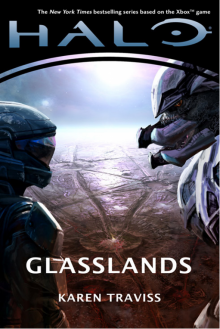 Halo: Glasslands
Halo: Glasslands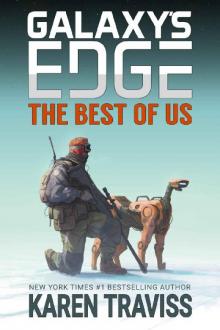 The Best of Us
The Best of Us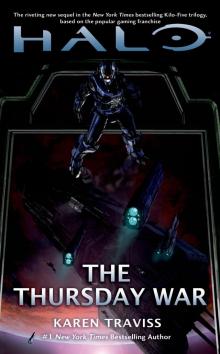 Halo: The Thursday War
Halo: The Thursday War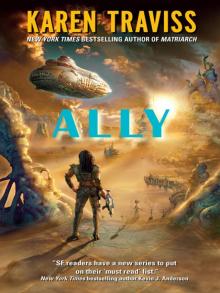 Ally
Ally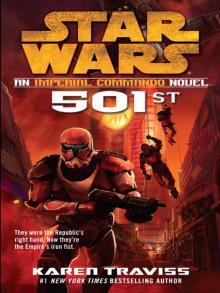 501st: An Imperial Commando Novel
501st: An Imperial Commando Novel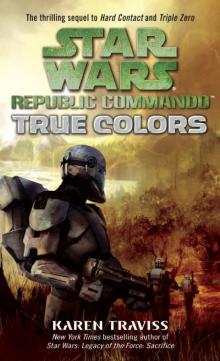 True Colors
True Colors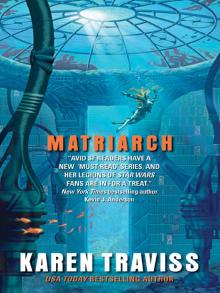 Matriarch
Matriarch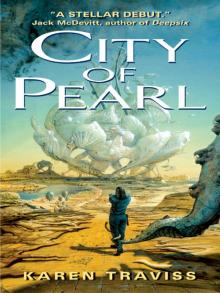 City of Pearl
City of Pearl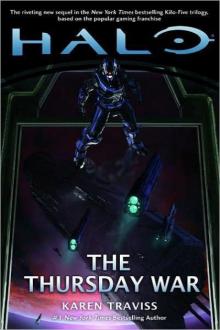 The Thursday War
The Thursday War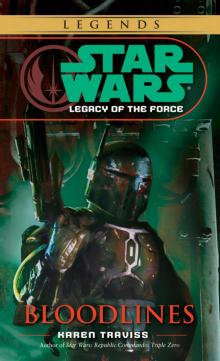 Bloodlines
Bloodlines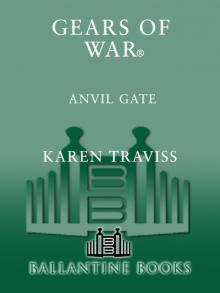 Gears of War: Anvil Gate
Gears of War: Anvil Gate Crossing the Line
Crossing the Line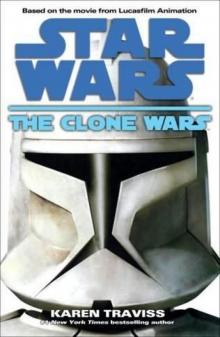 Star Wars - The Clone Wars 01
Star Wars - The Clone Wars 01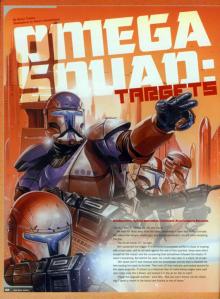 Omega Squad: Targets
Omega Squad: Targets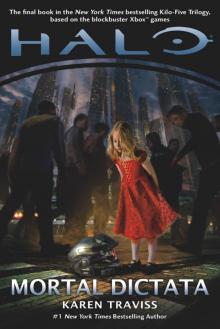 Halo®: Mortal Dictata
Halo®: Mortal Dictata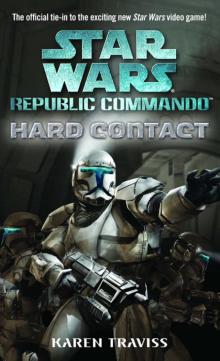 Hard Contact
Hard Contact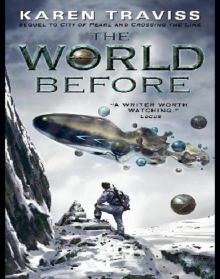 The World Before
The World Before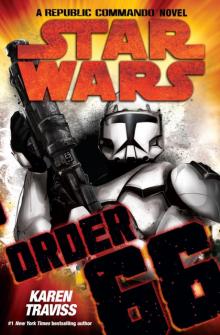 Order 66
Order 66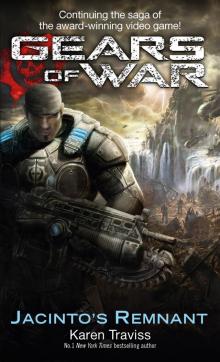 Gears of War: Jacinto's Remnant
Gears of War: Jacinto's Remnant Sacrifice
Sacrifice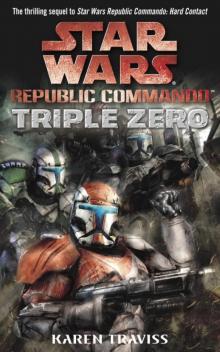 Triple Zero
Triple Zero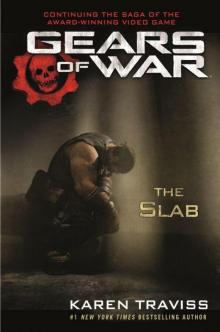 Gears of War: The Slab (Gears of War 5)
Gears of War: The Slab (Gears of War 5)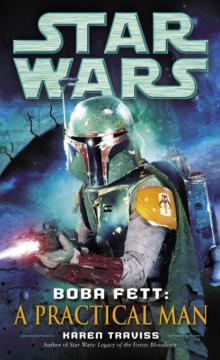 NEW JEDI ORDER: BOBA FETT: A PRACTICAL MAN
NEW JEDI ORDER: BOBA FETT: A PRACTICAL MAN Going Grey
Going Grey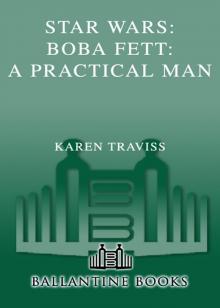 Star Wars: Boba Fett: A Practical Man
Star Wars: Boba Fett: A Practical Man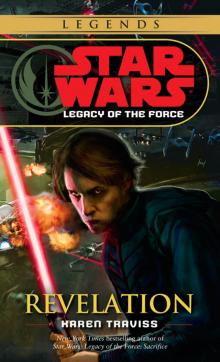 Revelation
Revelation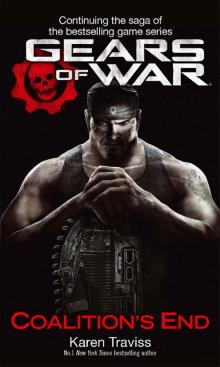 Coalition's End
Coalition's End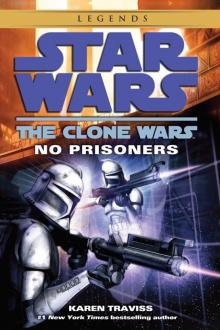 No Prisoners
No Prisoners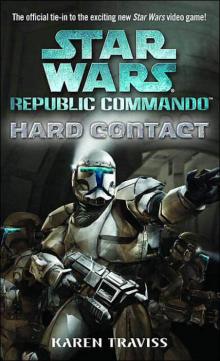 Star Wars Republic Commando: Hard Contact
Star Wars Republic Commando: Hard Contact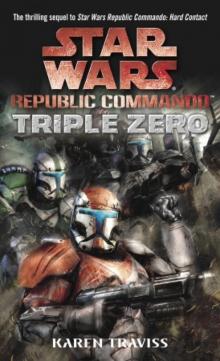 Star Wars: Republic Commando: Triple Zero rc-3
Star Wars: Republic Commando: Triple Zero rc-3 The Clone Wars
The Clone Wars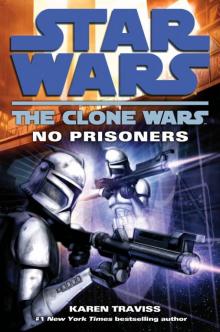 The Clone Wars: No Prisoners
The Clone Wars: No Prisoners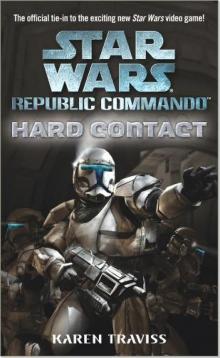 Star Wars: Republic Commando: Hard Contact rc-1
Star Wars: Republic Commando: Hard Contact rc-1 Judge
Judge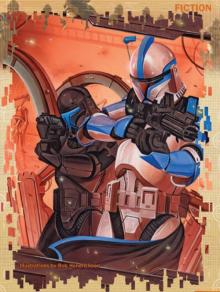 Omega Squad: Targets rc-4
Omega Squad: Targets rc-4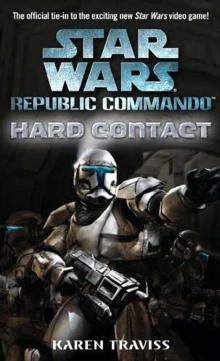 Star Wars - Republic Commando - Hard Contact
Star Wars - Republic Commando - Hard Contact